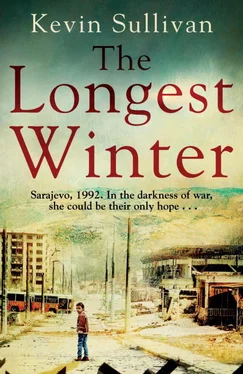Mrs Nurudinović was tired. She had no energy left to remember how they had once lived in this place. Often she stopped herself from remembering because the contrast with the present made her heart ache.
She sighed and said to Milena, ‘Let’s have coffee.’
Milena sometimes brought cigarettes and coffee. At the bar she could get things like that. Mrs Nurudinović admired Milena for the way she was able to take care of herself. She had never told Mrs Nurudinović her story – how she came to be in the city. She didn’t wear a wedding ring and she never spoke of a husband, but Mrs Nurudinović could tell, of course, that Milena was married: such things are clear to those who observe the world carefully.
Mrs Nurudinović could tell that Milena had never had children. She showed the sort of awkward tenderness with other people’s children that is distinct from intimacy with your own.
The old woman set water boiling on the stove and worried about how little wood she had on her balcony.
‘The concert will be good for you,’ she told Milena brightly, changing the subject. ‘You’ll enjoy yourself.’ She was pleased that Milena had agreed to take Nina to the children’s song festival. Nine-year-old Nina and her older brother Stanislav lived on the sixth floor. Their mother was in a town in Central Bosnia, stranded there when it became impossible to get back into Sarajevo. That, at least, was what was said. Mrs Hatibović was of the opinion that the woman could have returned to her two children if she’d really had a mind to, but that the man she was living with had objected. Mrs Nurudinović didn’t want to believe that this was true, but she was obliged to acknowledge, from what she knew of Nina and Stanislav’s mother, that it was a possibility. In any case, Stanislav, who wasn’t yet twenty, had looked after his sister, as well as making himself indispensable to neighbours, including Mrs Nurudinović and Mrs Hatibović, running errands, fetching water and firewood, and bartering his services for money and cigarettes. He’d been drafted into the civil defence. Mrs Nurudinović could see that the boy was struggling to do right by his sister, and when he told her that he wouldn’t be able to take Nina to the song contest because he was on firewatch duty she had suggested Milena.
Mrs Nurudinović knew that Milena wanted to belong , and she also knew that this would take time. When Mrs Nurudinović first encountered Milena she thought, here’s a complicated story . She moved into the apartment next door with practically no belongings. She earned her living at a bar that Mrs Hatibović said was an unsavoury place. She spoke with a country accent and kept to herself at the beginning. And there was that sadness about her. It wasn’t the sadness of bereavement; it was some other kind of sadness.
Mrs Nurudinović placed a brass salver with a coffee pot and small brass cups on the table and fetched coffee from the recess at the end of the room opposite the balcony. She poured a handful of beans into the grinder, sat down again and began to grind.
‘How they could just shoot him dead like that, in the street,’ she said, returning gloomily to the earlier subject. ‘It doesn’t bear thinking about.’
Milena shook her head.
Sometimes it’s hard to talk to someone when you don’t know the most important things about them, and Mrs Nurudinović didn’t know the most important things about Milena. She used to wonder, when certain topics came up in conversation – things to do with the war – whether she ought to be silent. She didn’t want to hurt Milena unintentionally by speaking about politics, or places and people on the other side.
‘What were those UN soldiers up to?’ Mrs Nurudinović wondered. ‘They were supposed to protect him.’
She was becoming very warm because of the grinder. These days, even grinding coffee exhausted her. On the radio they reported that citizens weren’t getting enough to eat – as though they didn’t know that already – and that one of the first signs of malnutrition was tiring easily. Mrs Nurudinović had never imagined that one day she would suffer from malnutrition, not in her worst nightmare.
Milena offered to take the grinder, and Mrs Nurudinović gratefully handed it to her. She lit a cigarette and listened to the short whirr and click as Milena turned the grinding arm, rhythmically and more regularly than Mrs Nurudinović had done.
Sitting there smoking, Mrs Nurudinović looked at the other woman’s face, watching Milena as she concentrated on the grinder, her nose a little wrinkled as she worked the tricky turn at the top of the device, her lips pursed. Her cheeks were pale and she had shadows under her eyes, but she was still pretty.
Mrs Nurudinović wore a heavy velvet skirt with a hem that reached nearly to the floor. Above this she wore shirts and cardigans, and a brightly coloured headscarf. Her face was deeply lined. Her eyes were brown.
Mrs Nurudinović had never tasted alcohol. She prayed at the mosque in Čengić Vila every Friday and observed Ramadan and Kurban. She communicated with her son in Zenica by means of telepathy and she had twice seen the ghost of her late husband, once in the kitchen of her apartment and once while walking by the Miljacka a year and a day after his funeral.
She was celebrated as a reader of cups. She could interpret the meaning of curls and twists in the intricate pattern of coffee residue drained onto a saucer.
Mrs Nurudinović believed that a length of red thread when prayed over and worn on any part of the body would ward off evil. She believed that a verse of the Koran attached to a person’s clothing would have the same effect.
She regarded all politicians as dishonest and incompetent, with the exception of Marshal Tito, who was wise even if inclined to vanity. From her twelfth birthday until the year after her marriage, when the garment was banned by the same Marshal Tito, Mrs Nurudinović wore a feređža and zar , covering her face and head.
She married in 1948 at the age of twenty-five. Perhaps that was another reason she liked Milena. Mrs Nurudinović had married late. She remembered the fear that tormented her as a girl when the years passed and no suitor came. There was a sweetheart in her youth, Izet, but he was killed in the war. Mrs Nurudinović knew the burden of loneliness.
There are no words sometimes to speak about sorrow.
Then came Emir, who had energy and confidence and a sense of fun – enough for both of them for half a dozen lifetimes. Mrs Nurudinović was glad her husband didn’t live to see what had become of his city and the people he loved. It would have been more than he could bear, even with his optimism and his appetite for life.
Her dowry consisted of two pillows, one set of woollen blankets and five white doilies embroidered by her grandmother on her mother’s side. One of the doilies remained now at the bottom of the long wardrobe drawer, in the bedroom where Mrs Nurudinović no longer slept for fear of being killed in her sleep by an artillery shell. She slept in the hall, placing an extra wall between herself and the frontline five hundred yards way.
When she entered her husband’s home on her wedding day she was given a loaf of bread wrapped in red cloth and a copy of the Koran. These symbolised a married life of integrity and wellbeing.
Her son was circumcised on his third birthday, and her husband made the Haj the year before his death, a fortuitous piece of timing that comforted Mrs Nurudinović. She believed that marriages that began between the bajrams of Ramadan and Kurban were ill-fated and that those who died during Ramadan were blessed.
But now she was tired. Perhaps, she thought, this was why that man’s death on the Airport Road affected her. She was tired of death, every death; she was tired of the dying that now went on around her. She was afraid that one day her compassion would be used up.
Читать дальше












